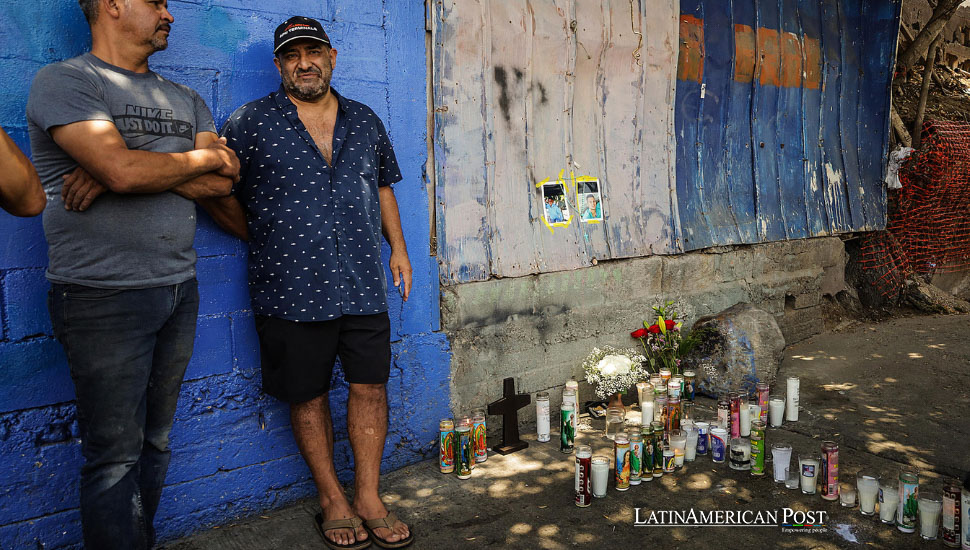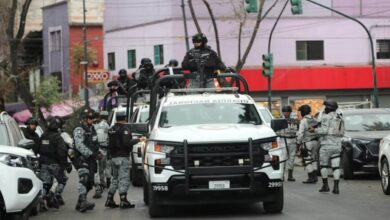A Wave of Violence in Tijuana Sparks Concern Among Business Owners

A recent surge in violence in Tijuana has alarmed business owners and residents. The crime wave, including several high-profile incidents, is causing economic and social concerns in this crucial border city.
A City Under Siege: Rising Crime in Tijuana
In the past two months, the northern border city of Tijuana, Mexico, has seen a dramatic increase in violence, leaving both residents and business owners in a state of heightened anxiety. Located just one kilometer from the international border crossing of San Ysidro, Tijuana has experienced at least five murders and seven gun-related assaults in bars, restaurants, and on the streets of its tourist areas. Notable incidents include a shooting at the water park ‘El Vergel’ on July 10, which injured three women and two minors, and the murder of a soccer fan outside the stadium of the professional team Xolos after a match.
Edgardo Flores, president of the Tijuana Citizen Security Committee, expressed deep concern over these events, describing them as a blatant challenge to authority. “Crime happens because it can, because there’s a landscape of impunity and a lack of consequences, but also because the environment is not conducive to safety,” Flores stated. He criticized the local security forces and the National Guard for their ineffective measures in tackling the city’s security issues. “Without proper analysis, infiltration work, undercover operations, and real intelligence, combined with active physical capability to combat insecurity, simply patrolling will not solve the problem,” he argued. Flores also lamented the lack of explicit coordination between state, municipal, and federal authorities in addressing the city’s escalating violence.
Systemic Failures and Community Impact
Heriberto García, an expert in legal affairs, public service, and human rights advocacy, pointed out that the justice system’s failings are a significant factor in Tijuana’s security woes. “Each party involved in security acts according to their understanding or interests,” he remarked, emphasizing that for any system to function effectively, it needs qualified personnel, appropriate laws, and adequate infrastructure and equipment. “If any of these three elements are missing, the entire system will fail,” García warned.
Carlos Robles, president of the Tourist Business Association of Avenida Revolución, noted that despite efforts to coordinate with the tourist police and install security cameras and emergency buttons, the violence has overwhelmed the city’s main tourist area. “Tourism has dropped significantly. Avenida Revolución, usually bustling with tourists, faces severe problems that impact everyone. Business owners, merchants, and citizens must meet with all levels of government to find solutions, or we will all suffer greatly,” Robles stated. He expressed concern over the economic impact, highlighting that Tijuana’s reputation as a tourist destination is at stake. The recent surge in violence has not only threatened the safety of residents and visitors but also the livelihoods of those who depend on the city’s tourism industry.
Last Wednesday, various social organizations and business sectors held a vigil for security in Tijuana, appealing for peace in response to the violent events. Hundreds of people, dressed in black and carrying candles, peacefully protested their worry about “this scourge that afflicts the entire society” and voiced their dissatisfaction with the “failed strategies implemented by different levels of government that have not yielded the expected results.”
The situation in Tijuana is reflective of broader security challenges faced by many Latin American cities grappling with crime and violence. In regions where drug trafficking and organized crime are prevalent, cities often experience similar patterns of violence, which in turn affect local economies and social stability. The failure to adequately address these issues can lead to a vicious cycle where crime deters investment and tourism, further weakening the economic foundations of affected communities.
Latin America’s complex socio-political landscape complicates the fight against crime. The region’s cities, including Tijuana, often deal with a mix of poverty, corruption, and weak governance, all of which contribute to high crime rates. The struggle to maintain law and order is not just a local issue but a national and regional one, requiring coordinated efforts across multiple levels of government and international support.
Community Response and Future Prospects
In the face of escalating violence, community responses like the vigil in Tijuana are not just crucial, but empowering. They raise awareness and serve as a call to action for authorities. The active involvement of business owners and residents in such initiatives underscores the collective desire for change and the need for effective strategies to restore peace and safety.
For Tijuana, the path forward involves immediate security measures and long-term investments in social and economic development. Enhancing the capabilities of law enforcement through better training and resources, improving the judicial system to ensure swift and fair justice, and fostering economic opportunities to reduce the lure of crime are all essential components of a comprehensive approach to tackling violence.
Moreover, collaboration with international partners can provide additional support and resources. Programs aimed at combating drug trafficking and organized crime, improving border security, and fostering economic development can significantly impact the situation. The experiences and successes of other Latin American cities in similar situations can offer valuable lessons and strategies. Tijuana, as a crucial border city, can benefit greatly from international cooperation in tackling these transnational issues.
Hope Amidst Challenges
While the current situation in Tijuana is dire, there is a strong sense of hope that concerted efforts can turn the tide. The active participation of the community, combined with effective government action, can create a safer environment. Learning from other regions that have successfully reduced crime rates can provide a roadmap for Tijuana and similar cities in Latin America.
The collaboration between local, state, and federal authorities is crucial. Transparent communication, accountability, and a shared commitment to addressing the issues are necessary for significant progress. Additionally, fostering trust between law enforcement and the community can enhance cooperation and effectiveness in tackling crime.
Ultimately, the goal is to create a Tijuana where residents feel safe and businesses can thrive. Achieving this requires addressing the symptoms of crime and the underlying causes. With a comprehensive approach that includes security, judicial reforms, and economic development, Tijuana can become a model for other cities facing similar challenges.
The recent surge in violence in Tijuana is a wake-up call for all stakeholders. It underscores the urgent need for effective strategies and coordinated efforts to ensure the city’s safety and prosperity. Business owners, residents, and government officials must work together to create a comprehensive plan that addresses immediate security concerns and lays the foundation for long-term stability and growth.
Also read: Mexico and Huawei Partner to Empower Women in the Digital Economy
As Tijuana navigates these challenging times, the resilience and determination of its community will play a pivotal role. By coming together and advocating for change, the people of Tijuana can push for the necessary reforms and support to overcome the current crisis. The lessons learned from this experience can serve as a valuable guide for other cities in Latin America, highlighting the importance of unity, effective governance, and sustainable development in the fight against crime.





